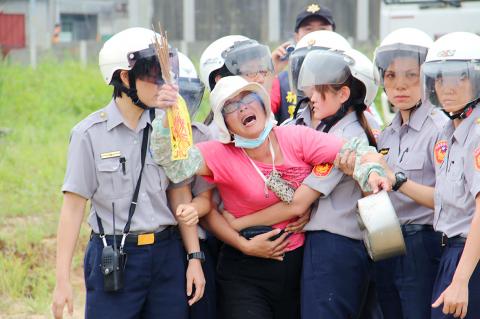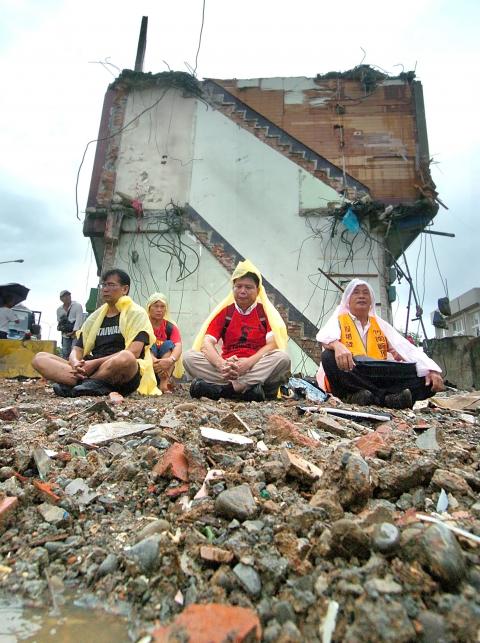While protesters against forced demolitions in Miaoli County’s Dapu Borough (大埔) demonstrated in front of the Presidential Office in Taipei yesterday, the county government sent in a demolition squad escorted by hundreds of police officers to tear down the Dapu houses, leading to waves of clashes.
“Stop the demolition. Keep the promise. Keep the houses,” almost 100 protesters supporting the resistance of four families in Dapu chanted as they ran through the police line toward the Presidential Office yesterday morning, upon hearing the news that the county government had started demolishing the houses while some members of the families and their supporters were in Taipei protesting.
At first, the police had the situation under control, but it soon became chaotic. A group of protesters walked into the middle of Ketagalan Boulevard and sat down, trying to paralyze traffic.

Photo: CNA
As officers tried to surround the protesters, another group of protesters came out from a park nearby with a giant banner, placing it in the middle of the road. Suddenly, three protesters ran toward the Presidential Office, reaching the barriers in front of it, only a few dozen meters away from the front entrance of the building.
More protesters followed, clashing with police and military police.
“My home, they are tearing down my home,” said Peng Hsiu-chun (彭秀春), a Dapu resident whose house was the first to be torn down during the county government’s surprise demolition yesterday, as she tried to move forward.

Photo: Fang Pin-chao, Taipei Times
The police responded by pushing her with their riot shields, pushing Peng to the ground, where she seemed to lose consciousness and was rushed to the hospital.
Peng’s husband, Chang Sen-wen (張森文), was also hospitalized earlier this month, reportedly because of the stress of the threat of the demolition, and remains in hospital in Taipei.
Meanwhile, conflicts broke out at several locations as young protesters and Taiwan Rural Front spokeswoman Frida Tsai (蔡培慧) attempted to go over the barrier into the Presidential Office.
“[President] Ma Ying-jeou (馬英九), come out. Stop the demolition,” they shouted.
“We are not unreasonable people,” Tsai said. “In fact, we’ve tried to negotiate with the government several times in a civilized and democratic way, but despite promises from Ma, [Premier] Jiang Yi-huah (江宜樺) and [Vice President] Wu Den-yih (吳敦義), the central government is doing nothing and allowing the county government to do whatever it wants.”
“What the county government is doing today is not only tearing down the houses, it’s also destroying the trust we have in the government and in justice,” Tsai added. “As you flatten the houses, be prepared for upcoming guerrilla-style protests. We will not give up.”
Yeh Hsiu-tao (葉秀桃), a Dapu resident and spokeswoman for the Dapu Self-Help Organization, accused the government of mentally torturing them.
“We’ve attended five negotiation meetings, and each time, it seemed so hopeful for us, but in the end, all the meeting conclusions are useless,” she said. “Ma always claims that he cherishes human rights, but where are our rights to property, to living and to survival?”
All the protesters were arrested by the police at about noon and several were charged with violating the Assembly and Parade Act (集會遊行法).
Meanwhile, in Dapu, demolition started a little before 10am by demolition squads escorted by more than 200 police officers. Prior to the forced demolition, the police blocked roads leading to the four houses, and removed residents and protesters — who had chained themselves to the houses — by force.
Dapu residents and their supporters began a sit-in demonstration on the land where their homes once stood immediately after the demolition work was completed and the police withdrew.
Separately yesterday, Wu dismissed criticism that he failed to keep his promise of keeping the homes in Dapu intact and said the government respected Miaoli County Commissioner Liu Cheng-hung’s (劉政鴻) authority in handling the case.
“The government has put emotional, rational and legal aspects of the case into consideration in handling the case. How is that breaking my promise?” Wu said.
Ninety-nine percent of the households were not against the county government’s plan, he added.
He said he has advised Liu to communicate with the Chang family regarding the Chang Pharmacy (張藥房) and suggested that the county government handle the case carefully.
“Liu had to act in accordance with the law and maintain justice for the residents of Miaoli County. I respect his decision,” Wu said.
In 2010, as premier, Wu had promised to preserve the four houses amid the government’s effort to resolve disputes over the county’s plan to expand a science park in the area.
He held a negotiation meeting with Liu and Jiang earlier this month to discuss the county government’s handling of the case. However, the meeting failed to resolve disputes and Liu remained firm that the four houses should be demolished.
To protest against the county government’s demolition of the buildings, a group of students interrupted Ma’s speech at an opening ceremony for a biotech exhibition at the Nangang Exhibition Hall, shouting: “Save Dapu.”
The protesting students were removed by the police as they continued to chant the slogan. Ma went on with his speech without commenting on the demolitions.
Democratic Progressive Party Chairman Su Tseng-chang (蘇貞昌) described the demolition as “state violence” that destroyed the Ma administration’s credibility and intensified people’s anger at, and disappointment in, the government.
“Vice President Wu and Premier Jiang, who pledged to keep the villagers’ houses intact, should step forward and stop the demolition,” Su said in Taipei earlier yesterday as the demolition was about to take place in Miaoli.
The demolitions showed that the government had not kept its promise and did not have compassion with underprivileged people, Su said.
Additional reporting by Chris Wang

MAKING WAVES: China’s maritime militia could become a nontraditional threat in war, clogging up shipping lanes to prevent US or Japanese intervention, a report said About 1,900 Chinese ships flying flags of convenience and fishing vessels that participated in China’s military exercises around Taiwan last month and in January last year have been listed for monitoring, Coast Guard Administration (CGA) Deputy Director-General Hsieh Ching-chin (謝慶欽) said yesterday. Following amendments to the Commercial Port Act (商港法) and the Law of Ships (船舶法) last month, the CGA can designate possible berthing areas or deny ports of call for vessels suspected of loitering around areas where undersea cables can be accessed, Oceans Affairs Council Minister Kuan Bi-ling (管碧玲) said. The list of suspected ships, originally 300, had risen to about

DAREDEVIL: Honnold said it had always been a dream of his to climb Taipei 101, while a Netflix producer said the skyscraper was ‘a real icon of this country’ US climber Alex Honnold yesterday took on Taiwan’s tallest building, becoming the first person to scale Taipei 101 without a rope, harness or safety net. Hundreds of spectators gathered at the base of the 101-story skyscraper to watch Honnold, 40, embark on his daredevil feat, which was also broadcast live on Netflix. Dressed in a red T-shirt and yellow custom-made climbing shoes, Honnold swiftly moved up the southeast face of the glass and steel building. At one point, he stepped onto a platform midway up to wave down at fans and onlookers who were taking photos. People watching from inside

Japan’s strategic alliance with the US would collapse if Tokyo were to turn away from a conflict in Taiwan, Japanese Prime Minister Sanae Takaichi said yesterday, but distanced herself from previous comments that suggested a possible military response in such an event. Takaichi expressed her latest views on a nationally broadcast TV program late on Monday, where an opposition party leader criticized her for igniting tensions with China with the earlier remarks. Ties between Japan and China have sunk to the worst level in years after Takaichi said in November that a hypothetical Chinese attack on Taiwan could bring about a Japanese

STREAMLINED: The dedicated funding would allow the US to transfer equipment to Taiwan when needed and order upgraded replacements for stockpiles, a source said The US House of Representatives on Thursday passed a defense appropriations bill totaling US$838.7 billion, of which US$1 billion is to be allocated to reinforcing security cooperation with Taiwan and US$150 million to replace defense articles provided to the nation. These are part of the Consolidated Appropriation Act, which the US House yesterday passed with 341 votes in favor and 88 against. The act must be passed by the US Senate before Friday next week to avoid another government shutdown. The US House Committee on Appropriations on Monday unveiled the act, saying that it allocates US$1 billion for the Taiwan Security Cooperation Initiative